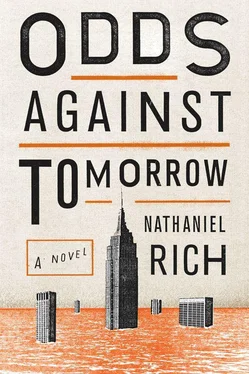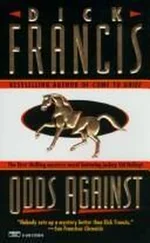“The market in the financial district has shown some signs of loosening up,” she had said on the phone. “Especially the high-rises. The images from Seattle rattled some nerves, I’m afraid. But we can direct our energies further uptown, if you’d prefer—”
“No,” said Mitchell, an edge in his voice. “The financial district is perfect.”
This is where America happens. Where we happen.
“Very good. If the high-rises don’t bother you, we can begin with Eight Spruce Street.”
He let her describe the building, but he knew the details already. At seventy-six stories, Eight Spruce Street was the tallest residential tower in New York. In high winds it could lean fourteen feet in any direction. At Fitzsimmons Sherman he would stare at it from his window on the seventy-fifth floor and wonder why in the hell any human being would consent to living 867 feet off the ground in the middle of one of the world’s most dangerous airspaces.
After Pam Davenport had finished showing him the concealed “self-closing” bedroom drawers, which slid tight with a plaintive whisper, she led Mitchell to the windows. He had been waiting for this. So, it seemed, had she. With a quick, joyful intake of breath, she walked up close to the glass and then, to Mitchell’s alarm, leaned her forehead on it.
“A view like this,” she said, her mouth releasing an oval of fog onto the glass, “makes you feel like queen of the city.”
Maybe. You certainly could see a lot of it. There was the Brooklyn Bridge, its ramps spooled like a pile of gray snakes. The water from this height was a thin navy border between the ashy flanks of Manhattan and Brooklyn, and the downtown skyscrapers, the ziggurats and belfries and minarets built in tribute to American industry, seemed plain and quaintly chunky, like the building blocks preschoolers played with, or Legos. It all made his legs feel very stiff. He thought of the skycity of his dreams and wondered whether some part of his brain — his amygdala, perhaps — had modeled those slender, infinite towers after Eight Spruce Street.
“Check this out,” said Pam Davenport, beckoning him forward. “You can see all — the way — down.”
He blinked, and the city began to canter diagonally across his vision. He tried to back away but his legs were too stiff.
“Mr. Zukor? Is everything all right?”
The window plunged at him. It socked him in the nose. He bounced off the glass and slid clumsily to the floor. Pam Davenport shrieked. All he could think of was the boy at John Day who sat down Indian-style on the fifty-yard line and died. When he opened his eyes there was a streak of blood across the glass, parallel to the Brooklyn skyline.
He heard his broker’s heels tapping on the hardwood, and then she was beside him with a wad of damp paper towels. She pressed it to Mitchell’s nose. The cold, pinkish water seeped down his lip and dropped onto his tie.
“Oh dear,” she said, and ran back for more paper.
He felt a sucking sensation in his right nostril. He snorted and a clot of blood exploded in the tissue.
“Oh my God,” said Pam, returning. “Is it broken?”
Mitchell explored the bridge of his nose with his free hand. He couldn’t remember whether the bumps and crevices he felt were the same old bumps and crevices, or whether his collision with the window had broken new ground and altered his entire facial topography.
“I guess it was the heat.”
“The quality of the air-conditioning units is simply unacceptable for a new building.” She looked more closely at him. “Do you have any medical condition I should know about?”
It really had been some time since Elsa had written. Five days? Six? This was unusual. Had he offended her? His last letter had been his most direct to date. He had explained that at FutureWorld he had learned that facing his fears head-on was the best way to defuse them. The window, at least, seemed to disagree.
The water seeped beneath his collar and onto his chest. When he realized that Pam Davenport had been mopping his face for several minutes with disintegrating paper towels and speaking in a hushed but increasingly hysterical voice, he forced himself to stand, using the wall as support.
“Listen, Pam,” he said, “maybe this isn’t such a hot idea after all.”
On the street, stumbling back to the subway, his hand pressing a paper towel to his nostril, he passed an old firehouse mobbed with schoolchildren. A fireman was blasting them with a fire hose. The ecstatic children screamed as they galloped through the jet. The water pooled around the gutter, which had been dammed by a weir of plastic bags. Three dogs, their owners trailing, cantered over to the puddle and began to slurp. The owners did not interfere but watched their dogs with expressions of profound longing.
11.
In the FutureWorld foyer Charnoble was waiting for him, consulting the watches on either wrist.
“We have our man from Edison Telecom in ten minutes.”
Mitchell walked past him, into his office.
“He wants to go over brain tumor epidemic scenarios again. Are you still fresh on the tumor scenarios?”
“In a decade, four percent of his workforce will develop gliomas,” said Mitchell impatiently, crossing the vast carpeted expanse. “Three percent acoustic neuromas, two percent salivary gland tumors, one percent meningioma, another five percent benign tumors. Financial damages can be extrapolated accordingly. OK?”
Mitchell removed from his desk drawer Elsa’s most recent letter. He read it over, looking for clues to her silence. There was her usual canoe sketch, the same neat schoolgirl’s handwriting. You’d think that if something were wrong you’d be able to see it in the handwriting, but penmanship that graceful indicated reason, orderliness, calm. Could it be some kind of subterfuge? He didn’t think Elsa was capable of subterfuge.
It was not a particularly long letter. She spent most of it recounting problems she’d had keeping the artesian well clean — because of the drought it had drained and was beginning to develop mold. She joked about one of her more avid comrades on the farm who had argued in defense of the mold, which after all was a colony of living organisms. “According to him, fifty-pound sacks of powdered milk are better than cartons of organic milk but not as good as milk squeezed out of our neighbor’s goats. Shopping for overalls in Augusta is better than shopping for overalls online, but weaving our own overalls out of hemp is better still. Nudity is best. Toothpaste without fluoride or parabens or propylene glycol is essential, but baking soda and peppermint oil does the trick fine, and a mush made out of crushed pine needles and dirt is ideal.” Elsa seemed in good spirits. There was nothing to indicate that she wanted to cut off contact with Mitchell.
“Any mail today, Alec?” he called out.
“Just the normal things.”
Mitchell ran back across the long ivory carpet to the small waiting room where the day’s envelopes and packages lay stacked on a coffee table. He hoped there wasn’t a letter from Elsa in the pile and he was afraid that there was not a letter in the pile and he was afraid that he was afraid.
“I’m still going to need you in the meeting,” said Alec. “He’s paying to see you, after all. They all pay to see you.”
“Start without me.”
Mitchell flipped through the envelopes. There was the usual assortment of doomsday paraphernalia, the daily harbingers of things to come: the September issue of the Food Safety Magazine ; a carton of ciprofloxacin; a report he had ordered from the Federation of American Scientists titled “Updated International Nuclear Warhead Database”; and the annual statement of the Reinsurance Industry Consortium, the association of gargantuan corporations that insured insurance companies. But no sign of Elsa’s canoe. The old familiar fears started growing inside him like a tropical forest.
Читать дальше












